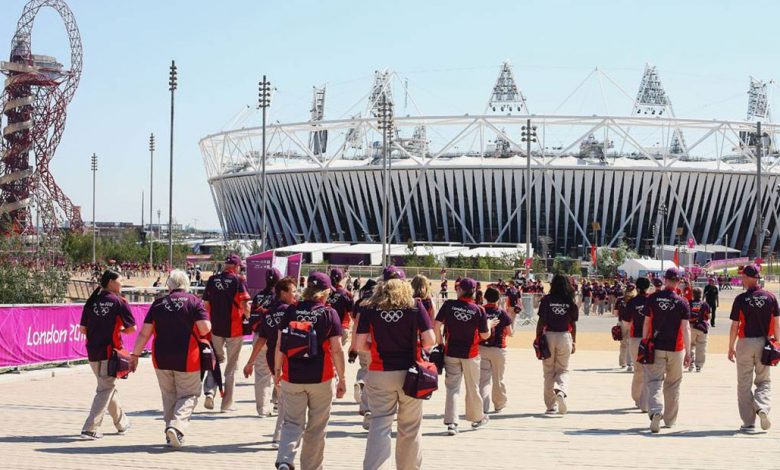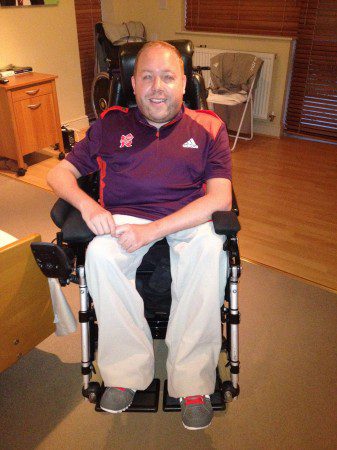
Games Makers: the story of one wheelchair user
Many have said that the success of the London 2012 Olympic Games has been largely thanks to the enthusiasm and tireless work of the Games Makers. So we spoke to one of them (wheelchair user, Ross Hovey) about his experiences.
I am 33 years old, from Cambridgeshire and have Spinal Muscular Atrophy type II as well as a spinal fusion. I work for Lloyds Banking Group in HR, official partners of the Olympic Games, who negotiated 250 Games Maker volunteer spaces for employees.
Approximately 20,000 of my colleagues and I applied to be a Games Maker, of which 450 were shortlisted and interviewed by LOCOG (London Organising Committee of the Olympic and Paralympic Games). 250 of us, including me, were lucky enough to be offered a role as a Games Maker. The end-to-end process of applying, training and undertaking the role took about two years in total.


Within this role we undertook several jobs, but primarily we were additional security and access control ensuring that only those with specific accreditation entered into exclusive areas. Some parts of the job were quite mundane, for example sitting at an accessible VIP entrance for a hour during which time nobody with accessible needs arrived.
However, other jobs were more exciting, such as manning the entrance to the Olympic Family seats and Olympics Family lounge where we welcomed VIPs and ensured their needs were fully taken care of.
Working there, I was fortunate enough to meet a number of famous faces; Lord Sebastian Coe, Paul Dyton (CEO of LOCOG), Avram Grant (ex Chelsea FC manager) and other people such as national presidents. Prince Edward also came for a tour of our venue, but sadly I didn’t get to meet him in person, I merely got a glimpse of him whilst he chatted to the many soldiers on duty!
Initially I was to be posted at Hyde Park and Lords for the triathlon and archery, but these venues were deemed to be not accessible for me to work at. They only realised this a month or two before the start of the Olympic Games, which was rather alarming, especially considering they knew I was disabled from the start.
There were a lot of challenges involved in being a Games Maker and using a wheelchair. The hours were long and I had to commute daily, which involved asking home carers to come in at 4am to get me up and showered, and put me to bed at 2am when I got in from a late shift, for which I had to give them higher pay.
Because I work for a partner of the Olympic Games and 50% of my time was still paid, I was able to continue using my Access to Work support worker. However, with fourteen hour days and only forty five hours support per week, I could have easily gone over budget.
But by budgeting I managed to avoid issues; I paid support workers in advance for hours they would be doing extra, and in the following weeks, where I don’t use my maximum hours, I will be paying some support workers in arrears for hours undertaken.
Getting in and out of London was challenging. Luckily LOCOG gave me a free parking pass for the venue so, despite the expense, I drove in and out of London daily. Having a congestion waiver because of my disability helped too!
If I had any criticism of the whole experience it was the shortsightedness of LOCOG in terms of how they dealt with support workers. For example, accreditation and my uniform had to be collected from a specific place at a specific time. However, they didn’t think it would be practical for my support worker to collect his at the same time, instead he had to go another day.
As I had to nominate three support workers for contingency I had to pay all three the extra hours required to each go and collect the accreditation, when I could have saved time and money by getting them to all come with me when I collected mine.
Support workers also had no uniform so stood out like a sore thumb, which felt awkward and embarrassing when VIPs arrived. There was also confusion over what support workers were entitled to in terms of meal vouchers.
But these were minor niggles and in general, my disability was catered for. The overall experience was good, despite how tired I felt. It was a once in a life time opportunity and I am proud that I helped make the games happen. Maybe I will consider applying for Rio 2016?!?
By Ross Hovey
We’re putting together a collection of articles with your pictures from Summer 2012. Whether at the Paralympic or Olympic Games, enjoying some of the events around the UK, or participating in local sporting events, we’d love to hear from you.
And let us know more about Paralympic sports you are involved in – email us at editor@97c.026.myftpupload.com, tweet us @DHorizons or send us a message on Facebook. Share your experiences with our community for a monumental Summer 2012!
Very interesting article. They never quite get the helping bit with the disabled quite right, but they do try. More research may have helped. Well done Ross!
I am in the capital for the Paralympics as a disabled ambassador myself, so I shall see first hand how it is!
i apologise for disturbing you. i found your article interesting esp. the late-night care which maybe i need so i would v.much value any info you could give me. i appreciate you might think this violates your privacy. i hope however you will realise your experience might benefit me & so reply to my email
i am an unemployed wheelchair-user & very weak. i need help dressing & transferring to a power-chair when i go out. when i return it is usually late i.e. between 11 p.m. & 2 a.m. & getting out of the power-chair then undressing is time-consuming & v.hard work because i do this on my own
i note you have home carers late at night & would be grateful if you would summarise your experiences which could benefit me e.g. are the late-night carers already in your flat waiting for you or do you contact them after you arrive? do you need a minimum of 2 carers to lift you out of your wheelchair with a hoist? is your care-package esp. the late night package arranged by the council or a private arrangement between yourself & a care company/agency? & if possible the name of the company & the cost
i can discuss this with Social Services or with an OT but it seems someone’s experience is better advice hence my email to you to which i hope you will reply. & yes i am unemployed but i need info i.e. get the data then … get ALL the data … then decide
in the meanwhile my best wishes to you
P.S. GO RIO!